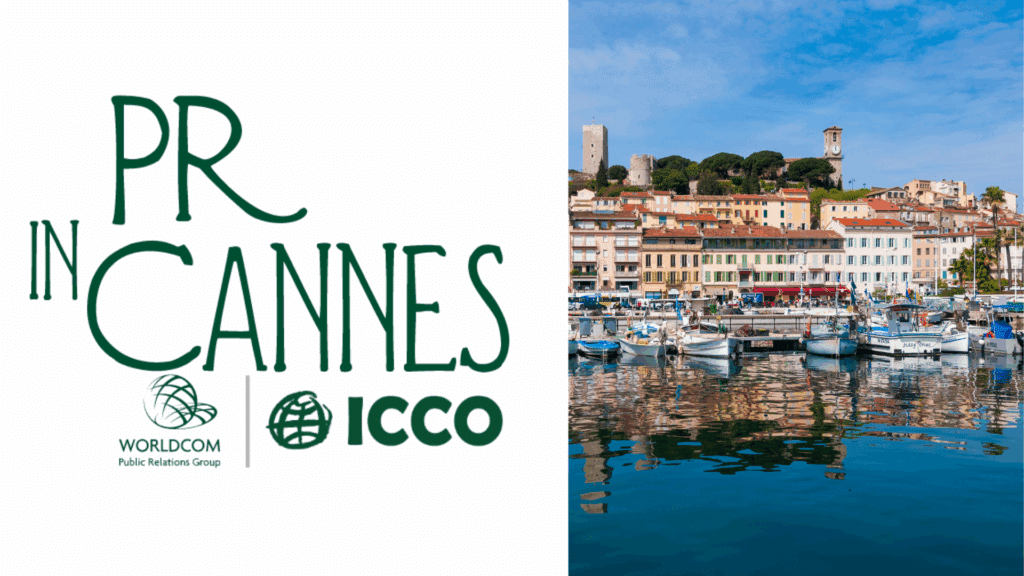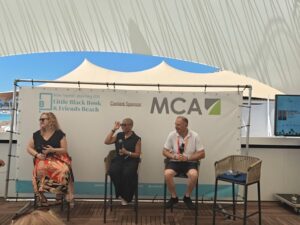
Cannes 2025: Key Takeaways from ICCO’s ‘PR in Cannes’ Sessions
Cannes Lions
Posted 08 Jul 2025
The International Communications Consultancy Organisation held a series of discussions on the Little Black Book Beach in Cannes.
CANNES — The International Communications Consultancy Organisation (ICCO) held a series of conversations on the Little Black Book Beach in Cannes, ‘PR in Cannes’, which asked: How can PR professionals secure a more central role in business and society?
With support from partners including Team Farner, Worldcom, AMEC, FIBEP, PRCA, IW Group, SEC Newgate and PRovoke Media, the event gathered agency leaders, in-house teams, industry bodies, and comms professionals from around the globe. The aim? To stop underselling PR and start showcasing its true value to business.
The programme included one roundtable and six fast-paced panel discussions, with ample time for informal networking on the beach.
The day kicked off with an insightful roundtable led by Sarah Waddington, interim CEO of the PRCA, exploring the future of PR agencies. Joined by David Blois (M&A Advisory), Alistair Kellie (SEC Newgate), Michael Frohoff (PR:E), and Lauren Winter (FleishmanHillard), the discussion addressed the challenges and opportunities shaping the future of agencies. Topics included innovation, investment, and the integration of data insights.
The panel stressed the importance of ethical practices, leadership development, and the need for PR professionals to actively shape the industry’s future, rather than merely responding to change. Together, the speakers laid out a roadmap for how agencies can adapt and thrive in a shifting landscape, reinforcing PR’s role as both a creative and strategic force in business and society.
The first afternoon panel focused on one of the industry’s most talked-about topics: AI. Moderator Sarah van Mosel, executive director at the PVBLIC Foundation, called AI “a new industrial revolution,” setting the stage for a discussion on how AI is reshaping the way communications teams work.
The panel argued that AI tools, when combined with human creativity, can lead to smarter strategies and more efficient time management. Instead of fearing AI, the speakers emphasized that PR professionals must take the lead in demonstrating how it can build trust and support long-term business goals.
The next session explored how PR can shift the conversation around climate change from apathy to action. Speakers noted that years of bleak messaging have left people feeling powerless, and argued that blending scientific data with human, hopeful stories is key to driving real change.
This conversation was a strong example of PR stepping into a leadership role. Used strategically, communications can help solve complex problems and shape long-term behaviour, rather than simply explaining them after the fact.
Next up, a panel delved into the AMEC Barcelona Principles Update 4.0, a crucial update aimed at modernising communication measurement, fresh from its launch at the AMEC Global Summit in Vienna the week before Cannes. Speakers (pictured) including AMEC global MD Johna Burke outlined t6he need to focus on outcomes, transparency, and meaningful insights.

Paneltalk: „2025 and Beyond: Measuring What Truly Matters“ with Johna Burke (AMEC), Allyson Hugley (LinkedIn Marketing Solutions) and Thomas Netousek (eMedia Monitor)
As Allyson Hugely, LinkedIn’s global marketing solution lead, put it: “Measurement must evolve to tell authentic stories about impact, not just the numbers.” Panellists shared examples of how adopting these principles builds trust, fosters accountability, and drives continuous improvement in evaluation, marking a transformative shift in PR measurement.
The next session focused on how media intelligence can help rebuild trust in an era of misinformation and fractured audiences. The panel discussed the need for transparency, credible sources, and honest storytelling, backed by smarter tools and stronger information validation.
The session introduced the Media Trust Initiative, a framework for organisations to track and strengthen their efforts over time. It also called on agencies to take greater responsibility in shaping public information and contributing to a more trustworthy media environment.
Sponsored by Worldcom PR Group, this panel examined how AI is reshaping the role of PR. Corinna Voss (HBI) and Tom Coyne (Coyne PR) argued that AI is not a replacement for PR , butan opportunity to redefine its role in building reputation and trust.
Earned media emerged as a key asset in this discussion. Voss linked it directly to brand reputation, while Coyne emphasised the need for strategies that balance human creativity with AI-driven optimisation.
The panel also explored Generative Engine Optimisation (GEO), a growing focus on how PR content can become more discoverable by AI systems. Supporting data showed that 61% of communication managers still rely on outdated metrics, and 79% struggle to measure outcomes effectively. This gap underscores the need for more modern, transparent approaches. As Voss put it, “PR is the bridge between innovation and impact.”
The final session featured Melanie Faithful Kent, CEO of Team Farner, and Rebecca Mayo, deputy CEO of Lansons, who discussed how PR agencies can stay relevant in an AI-driven world. They argued that agencies must evolve from execution to insight, positioning themselves as strategic advisory partners for clients.
Both speakers pointed to borderless collaboration as a significant opportunity, allowing agencies to tap into global talent without being restricted by location. They also encouraged agencies to challenge legacy structures and ways of working, not just to keep up with clients, but to create people-first cultures rooted in values and long-term trust. Faithful Kent concluded that future-proof agencies need to collaborate not only with clients but also with competitors and other industries.
PR in Cannes began with a challenge to the industry to shape what comes next. Over the course of the day, that challenge was met with bold ideas, visionary trends, and a collective belief in the power of communications to influence real-world change.
The sessions brought people together to have honest conversations about what needs to change for PR to fulfil its potential as a strategic partner to businesses. If we want to achieve that, we must seize the conversation on trust, show our value through outcomes, and take responsibility for the influence we have.
It may have been the first PR-focused event at Cannes Lions, but it won’t be the last. The energy on the beach made one thing clear: the industry is ready to stop underselling itself and start owning its impact.
About the Author: Patrik Schober
Patrik Schober is managing partner of PRAM Consulting and was the organiser of the ICCO ‘PR in Cannes’ event.